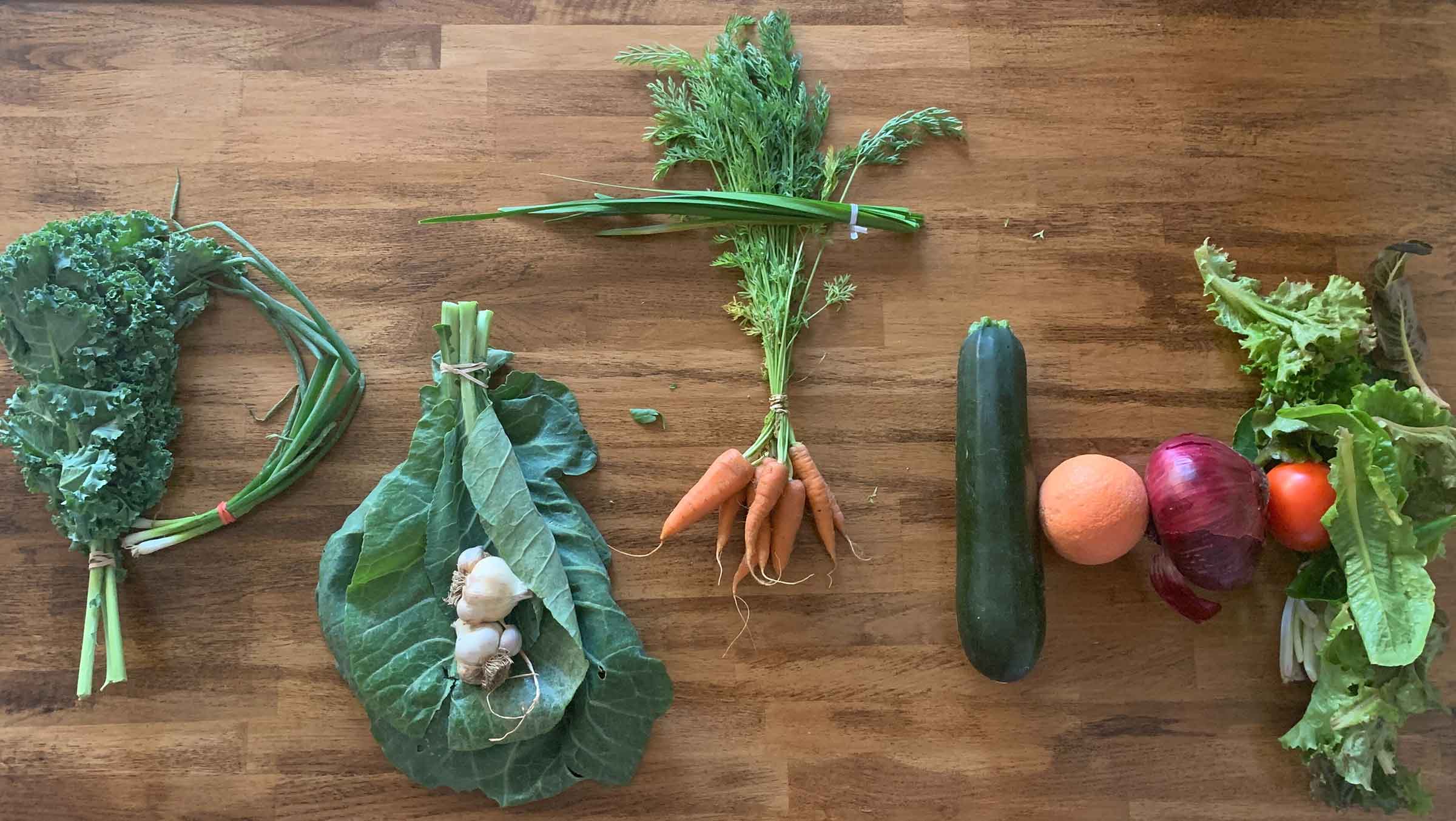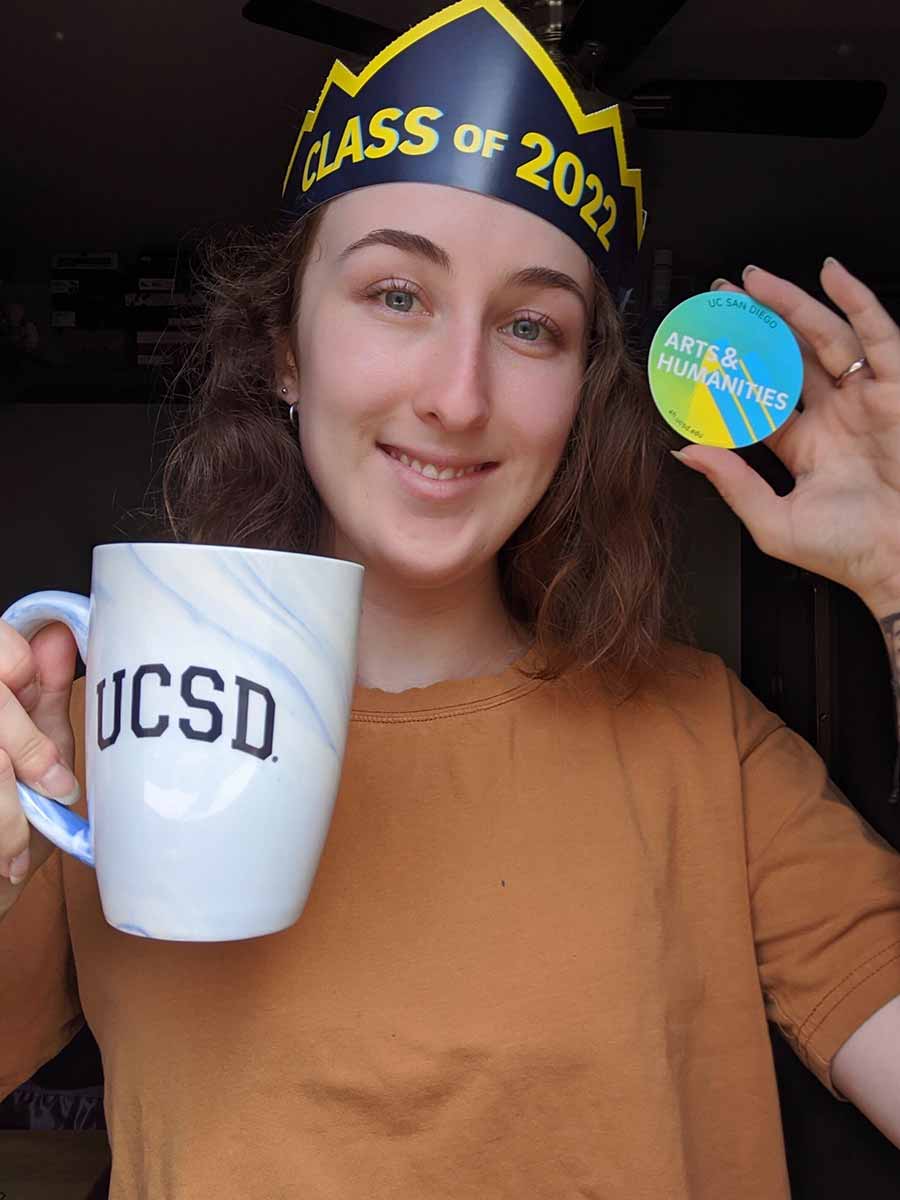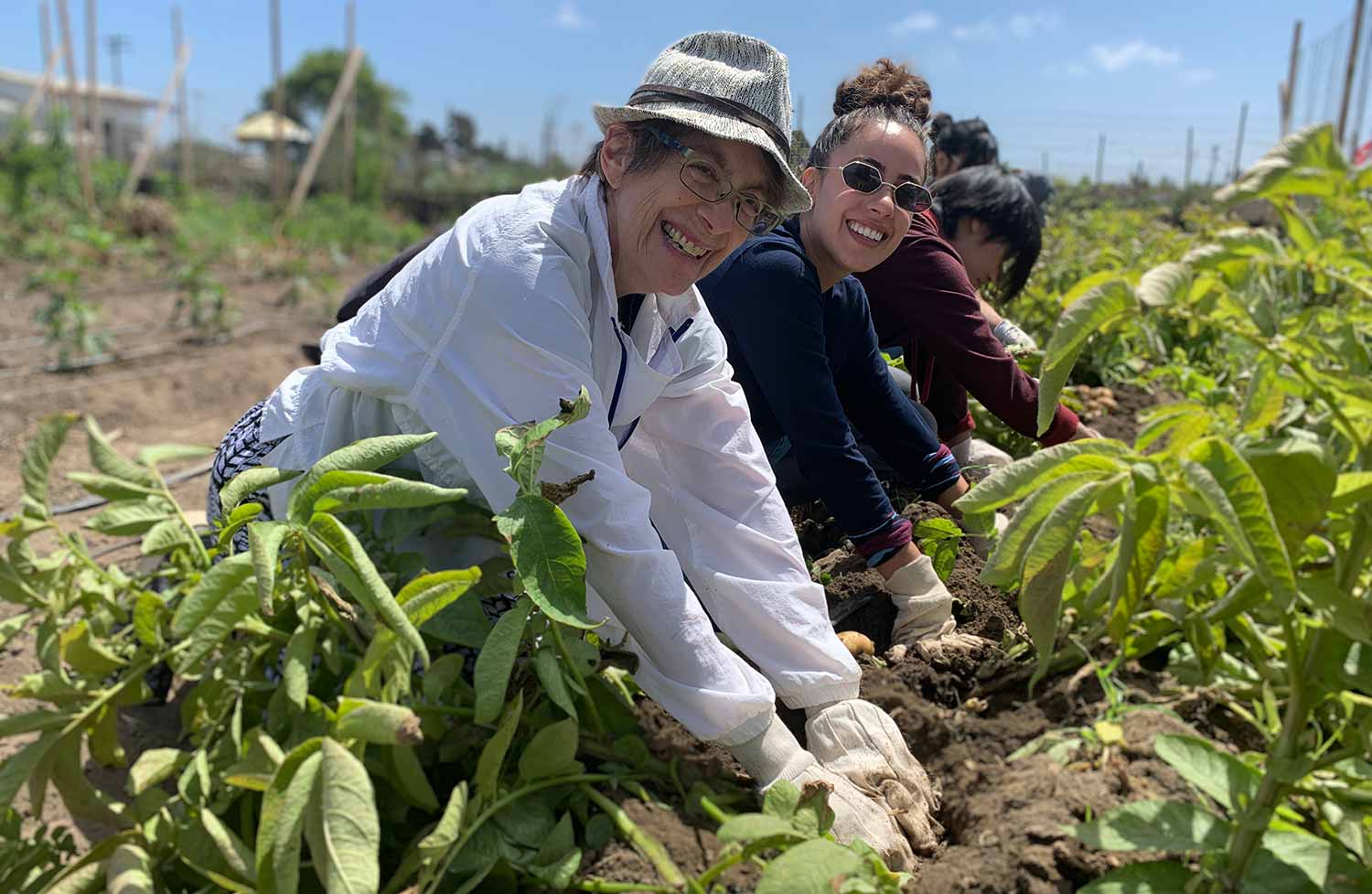
By:
- Anthony King
Published Date
By:
- Anthony King
Share This:
Planting the Seeds for Transfer Student Success
Through food justice, mentorship and access, Arts and Humanities PATH program helps students transition to campus

This year’s PATH Summer Academy included a CSA produce box from alumni-owned Good Neighbor Gardens. Photos courtesy: Division of Arts and Humanities.
When Jessie Castro and Famo Musa were first accepted to UC San Diego, they had concerns many transfer students face: Can I handle the pace of the quarter system? Will I be able to balance my job, keep up with my family commitments and still pass my classes? Do I even belong?
Along with 25 others, the pair got a jump start on their transition to the university in July by completing the five-week intensive PATH Summer Academy, giving each student two classes toward their degrees and providing first-hand access, albeit virtual, to campus resources that put their concerns to rest.
“My goal is to earn my bachelor’s degree in philosophy and continue my education to be able to become a college professor,” Castro said. “I would like to use my career to encourage more women of color to study disciplines in which they are not typically represented, just as I have.”
The PATH program—Preparing Accomplished Transfers to the Humanities—is a partnership between the UC San Diego Division of Arts and Humanities and the San Diego Community College District, funded by multiple grants from the Andrew W. Mellon Foundation to break down barriers specific to transfer students in the arts and humanities. This year’s academy cohort joins more than 100 community college transfers from City, Mesa and Miramar colleges who have benefited from the PATH program over four years.
Wisdom and passion

Literature major Emily Vastola with her UC San Diego Class of 2022 swag, hand delivered for the PATH Summer Academy.
Transfers enter the university as third-year students, when the majority of their classmates have already acclimated to and learned how to function successfully within the university, like knowing where to go for financial-aid help, how to use The Library’s catalogs, or even just how to maneuver across campus.
But transfer students often come from much more diverse backgrounds with different lived experiences, wisdom and passion, which the PATH program welcomes. Some are older. Some have families of their own to support, like Musa. Many are First Gen, like Castro. Most never even dreamed of getting into UC San Diego.
“Transfer students, in particular, face some pretty spectacular barriers to higher education, and our program was established to not only overcome those obstacles but to really rethink and develop how we, as a university, can ensure success for this important group of students that enrich us all as an institution,” said Division of Arts and Humanities Dean Cristina Della Coletta.
Workshops for the Summer Academy include detailed looks at the Triton Transfer Hub, Career Center, Library, Financial Aid, Writing Hub and Teaching + Learning Commons, and programs within Study Abroad. There are even workshops on mindfulness, micro-aggressions and how to successfully access the student Counseling and Psychological Services, CAPS.
“It is not enough to simply pat ourselves on the back for admitting more transfer students, especially this year with the uncertainty caused by the pandemic and remote learning. We need to work with them to identify and remove specific barriers once they’ve been accepted as well,” Della Coletta said. “The PATH program is one way we’ve successfully been able to do this.”

Department of Literature professor Stephanie Jed at a community farm for last year’s “Politics of Food” course. This year, program coordinators brought the farm to the students.
Food for justice
Coming from a 12-week semester system, the students get a crash-course in academic intensity by taking two classes for Summer Academy, completing them both in just five weeks: “The History of California” led by Department of History professor and PATH faculty coordinator Daniel Widener, and “The Politics of Food: Justice, Diversity, Community” led by Department of Literature professor and Italian Studies Program director Stephanie Jed.
Both classes specifically address race, class and inequality, with “The Politics of Food” using food justice to teach research skills at the crossroads of critical race theory, environmental studies and sustainability.

Transfer student Famo Musa, a Literature major, studies at home.
“The premise in organizing this course is that we are all indispensable members of the food system, and therefore, we have the power and responsibility to work, think, eat and learn about food in ways that make this system more equitable, sustainable and just,” Jed wrote in the course description.
Students were given a produce delivery from Good Neighbor Gardens, a San Diego-based Community Supported Agriculture, or CSA, program. A subsequent “CSA Box Talk” workshop was held with owner Mia Vaughnes, a UC San Diego alum who graduated in 1989, followed by a cooking-night activity to develop bonds within the cohort.
In the class itself, the founders of Pixca Urban Farm—a San Ysidro-based organization providing fresh produce and flowers to the South Bay region—discussed community gardens and food deserts. Through Pixca, the program provided seeds, soil and a planter box for the students to grow their own vegetables at home, a unique replacement to visiting Pixca Farms as done in previous years.
“Seeing how food is grown and really beginning to think about what is behind the food that we eat is impactful,” said Fartoon Hagi-Mohamed, a Literature major who took Summery Academy last year and served as a mentor this year. “This was a rich experience for them, being able to do that in their own homes.”
Together as mentors
Mentors like Hagi-Mohamed are critically important to the Summer Academy, and they worked hand-in-hand with staff from the Division of Arts and Humanities to keep continuity intact while navigating the uncertainties caused by the pandemic. The division decided early to press forward with this year’s academy, enlisting mentors to develop workshops, coordinate and lead activities, and serve as a go-to resource for answers to student life.
Last year’s PATH students Elisa Ady and Zimri Zapata, entering their final year this fall with Hagi-Mohamed, also served as mentors and said what was most challenging was replicating the connections they initially felt, only in a virtual environment.
“A lot of the questions that were on our minds were about how to foster community when there’s no real precedence in this platform,” said Ady, a Literature major. “It helped when we put our heads together to think of activities that were mentor-led. That was our central way of trying to create something from virtually nothing.”
The mentors organized 13 optional activities for the five weeks, in addition to the two classes: an open mic night, two popular Activism Thru Art hours, a UC San Diego Recreation workout session and the CSA cooking night. Ady, Zapata and Hagi-Mohamed all felt they were successful in cultivating the community they experienced the prior year.
“I think it was a little awkward trying to break down the Zoom barrier and feel like you’re connecting with someone,” Zapata, a Visual Arts major, said. “We’re still in the middle of a global pandemic, so the willingness of the students to go above and beyond to connect with other people was really amazing.”
Share This:
You May Also Like
Stay in the Know
Keep up with all the latest from UC San Diego. Subscribe to the newsletter today.


